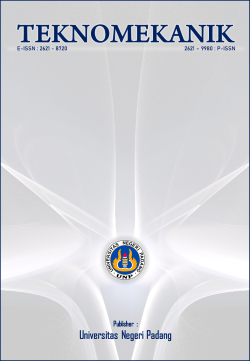Analysis of factors forming the students’ business interests at Vocational High School 2 Payakumbuh
DOI:
https://doi.org/10.24036/jptk.v3i1.3323Keywords:
Forming factors, Business interest, Vocational education, Automotive engineeringAbstract
This study aims to ascertain the Forming Factors of Business Interest of Students in the Department of Light Vehicle Engineering at Vocational High School 2 Payakumbuh based on the internal factors: (1) Education, (2) Personality, (3) Motivation, (4) Experience, (5) Knowledge, (6) Opportunities, (7) Commitment, (8) Discipline, and (9) Leadership. This type of study was quantitative descriptive. The study population was all TKR Department students in the academic year 2019/2020 consisting of 110 students. Then, there were 85 students as samples, using the Slovin formula with a precision of 5%. Data analysis techniques are descriptive analysis and confirmatory analysis for hypothesis testing. Confirmatory analysis there are 9 independent variables analyzed through Anti Image Matrix Analysis, from the results of the research trial there are 2 variables: Education and Knowledge have MSA scores that do not meet the requirements: 0.338 <0.500 and 0.353 <0.500 so only 7 variables for further analysis. In the analysis of communilities there are 3 variables which have values below 0.500, namely Personality: 0.477, Experience: 0.306 and Commitment: 0.475, then this variable is discarded. The results of the analysis of the research trials formed a factor group of 3.128 which means that the factor was able to explain 78.2% of the 4 variables, and 21.8% of the other variables. It can be concluded that there are 4 variables: motivation, opportunity, discipline, and leadership which are the most dominant factors.
Downloads
References
Dalyono. Pengajaran Disiplin Dan Harga Diri. Jakarta: PT Indeks. 2001.
www.pusdiknakes.or.id. 2006.
Depdikbud. Garis-Garis Besar Program Pengajaran (GBPP). Jakarta:Pusat Kurikulum-Balitbang. Depdiknas. 2004.
Ganefri dan Hendra Hidayat. (2013). The Secret of Entrepreneurship Rahasia Kewirausahaan. Bandung: Alfabeta.
Riyanti. (2003). Kewirausahaan Dari Sudut Pandang Psikologi Kepribadian. Jakarta : Grasindo.
Singgih, E. M., & Bawono, I. R. (2010). Pengaruh Independensi, Pengalaman, Due Professional Care dan Akuntabilitas Terhadap Kualitas Audit. Simposium Nasional Akuntansi XIII, 1-21.
Slameto. Belajar Dan Faktor-Faktor Yang Mempengaruhinya. Jakarta: PT Rineka Cipta. 2003.
Sugiyono. Metode Penelitian Kombinasi (Mixed Methods). Bandung: Alfabeta. 2011.
Suryana. (2013). Kewirausahaan : Kiat dan Proses Menuju Sukses. Jakarta: Salemba Empat.
Suryaman. (2006). Minat Berwirausaha Pada Mahasiswa Pendidikan Teknik.Semarang: Alfabeta.
Downloads
Published
Issue
Section
License
Copyright (c) 2020 Fajar Maulana, Wakhinuddin Wakhinuddin, M. Giatman, Edidas Edidas

This work is licensed under a Creative Commons Attribution 4.0 International License.





